KARACHI: A high-profile militant, who was associated with the Pakistani Taliban and appointed the group’s chief in the southern Pakistani province of Sindh, was killed by his own guard in Afghanistan’s Kandahar city earlier this week, a Pakistani counterterrorism official said on Friday.
Abdul Wahab Larak, who was known as Molvi Khush Muhammad Sindhi in militant circles, had worked for the outlawed Harkat-ul-Jihad-al-Islami (HuJI), a militant outfit founded in 1980 to fight the Soviet forces in Afghanistan. Larak later joined Usman Saifullah Kurd group of the outlawed Lashkar-e-Jhangvi (LeJ) sectarian militant outfit, which has claimed several high-profile bombings in Pakistan. He became chief of the LeJ faction after the killing of Kurd in 2015.
In August 2020, Larak merged his faction of the LeJ with the Pakistani Taliban, or the Tehreek-e-Taliban Pakistan (TTP), which is a separate movement from the Afghan Taliban and has fought for years to overthrow the government in Islamabad and rule with its own brand of the Islamic law. He was subsequently appointed the Sindh chief of the TTP.
“Abdul Wahab Larak was killed by his own guard in Kandahar on March 23,” the Pakistani counterterrorism official told Arab News on the condition of anonymity.
“It’s hundred percent confirmed that Larak has been killed. It’s a big blow to the TTP that wanted to strengthen the Sindh chapter of the organization through him,” said the official, who also shared photographs of the deceased militant.
In August 2020, the TTP had announced that Usman Saifullah Kurd group of the LeJ, working under the leadership of Molvi Khush Muhammad Sindhi, had been merged with the Pakistani Taliban.
“And promised to work for the establishment of the Islamic system in Pakistan under the flag of Tehreek [TTP] by pledging allegiance on the hands of Tehreek’s Amir Mufti Noor Wali alias Abu Mansoor Asim,” the TTP said in a statement at the time.
According to the Sindh police’s Red Book, which profiles wanted criminals and militants, 52-year-old Larak was fluent in speaking Urdu, Sindhi, Pashto and Arabic languages.
The militant, who also went by the alias of Hakeem Ali Jan, hailed from Khanpur town of Sindh’s Shikarpur, a district known for the killings of and bomb attacks on minority sects. In January 2015, a powerful blast at an imambargah killed 53 people and wounded 57 others in Shikarpur.
Asked if Larak had a role in it, the counterterrorism official said it was not confirmed yet, but the deceased militant had been involved in multiple killings and bomb attacks.
“Larak was involved in targeted killings of and attacks on Shia religious minority,” he added.
High-profile militant wanted by Pakistan killed in Afghanistan’s Kandahar — official
https://arab.news/cn5wu
High-profile militant wanted by Pakistan killed in Afghanistan’s Kandahar — official

- Abdul Wahab Larak merged his faction of outlawed Lashkar-e-Jhangvi with Pakistani Taliban in Aug 2020
- The militant had remained part of Harkat-ul-Jihad-al-Islami that fought Soviet forces in Afghanistan
Pakistan court hands life sentences to four in 2018 murder of lawmaker
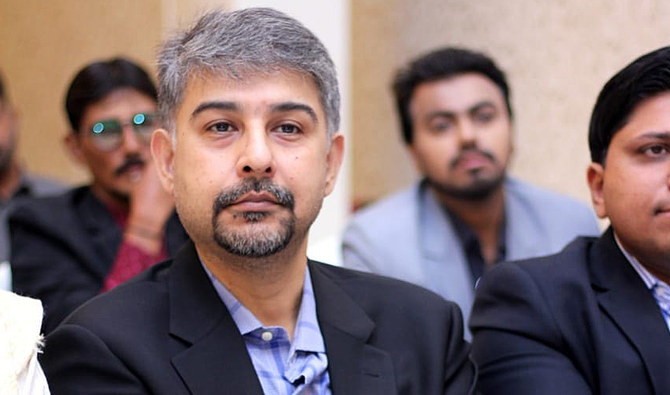
- The accused were convicted of aiding, abetting, reconnaissance, and facilitating murder of Syed Ali Raza Abidi
- Court suspends proceedings against prime accused, citing Supreme Court ruling that prohibits judgments in absentia
KARACHI: A Pakistani court on Monday handed life sentences to four accused who were convicted of aiding, abetting, reconnaissance and facilitating the murder of a Pakistani lawmaker in the southern city of Karachi in 2018.
Ali Raza Abidi, a businessman and politician, who belonged to the Muttahida Qaumi Movement-Pakistan (MQM-P) party, was shot dead outside his residence in the Defense Housing Authority (DHA) area of Karachi.
Police had registered a case against the suspects in the Gizri police station under the Anti-Terrorism Act.
“The evidence shows that all the accused persons in furtherance of their common intention are involved in the commission of murder of Syed Ali Raza Abidi and they are equally responsible for the act,” Zeeshan Akhter Khan, the Anti-Terrorism Court judge, stated in his detailed judgment.
The convicts, Muhammad Farooq, Muhammad Ghazali, Abu Bakar and Abdul Haseeb, were also fined under various sections of the Pakistan Penal Code. They can appeal the verdict within 15 days.
The court, citing a Supreme Court judgment, said since a case against absconding accused, Bilal, Hasnain, Ghulam Mustafa and Faizan, could not be proceeded in absentia, it was placed on dormant status until their arrest or appearance before the court.
Abidi was elected as a Member of the National Assembly (MNA) on the ticket of the MQM-P in the 2013 general election. He, however, quit the MQM-P following the party’s formation of an alliance with the rival Pak Sarzameen Party (PSP).
Despite briefly rejoining the MQM-P in December 2017, Abidi ultimately parted ways with the party in September 2018. He was killed months later on December 25, 2018.
Pakistani PM meets Malaysia’s Ibrahim on WEF sidelines, invites on official Islamabad visit
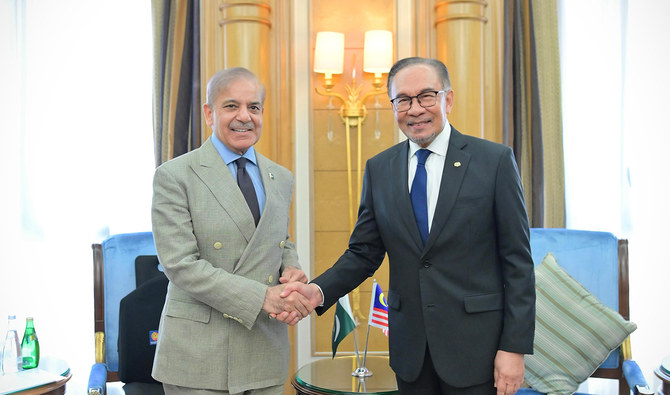
- Shehbaz Sharif was in Riyadh to attend a WEF special meeting on Global Collaboration, Growth and Energy for Development on April 28-29
- The Pakistan PM invited Malaysian traders and businessmen to visit Pakistan to discuss expansion of bilateral trade, investment relations
ISLAMABAD: Pakistan’s Prime Minister Shehbaz Sharif on Monday met his Malaysian counterpart Anwar Ibrahim in Riyadh and invited him to visit the South Asian country, Sharif’s office said.
The two leaders met on the sidelines of a two-day World Economic Forum (WEF) summit in Saudi Arabia’s capital of Riyadh, according to PM Sharif’s office.
During the meeting, both sides agreed to further develop relations.
“The two leaders also agreed to hold the next meeting of the Joint Ministerial Commission in Islamabad soon,” Sharif’s office said in a statement.
“The prime minister reiterated his invitation to Malaysian Prime Minister Anwar Ibrahim to pay an official visit to Pakistan.”
The two leaders discussed bilateral ties in the fields of education, science and technology, livestock and trade, and vowed to further enhance cooperation in the future, according to the statement.
PM Sharif also invited Malaysian traders and businessmen to visit Pakistan to discuss the expansion of bilateral trade and investment relations.
The Pakistan prime minister was in Riyadh to attend the WEF special meeting on Global Collaboration, Growth and Energy for Development on April 28-29.
Sharif spoke about Gaza at the closing plenary of the two-day summit and held several bilateral meetings, particularly with Saudi officials, during the visit.
No peace in the world without ceasefire in Gaza, Pakistani PM says at WEF
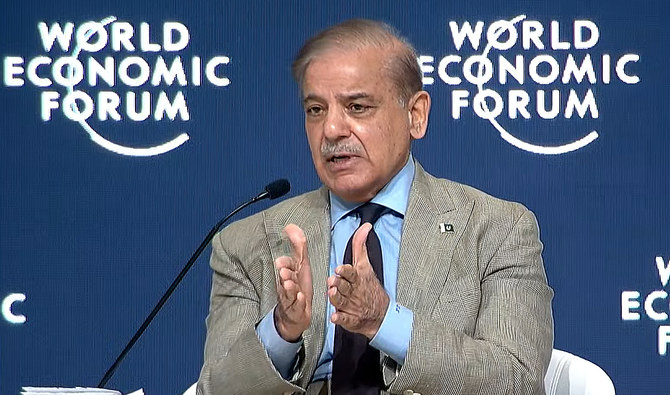
- Pakistan does not recognize Israel and calls for an independent Palestinian state based on pre-1967 borders
- Sharif is in Riyadh for two-day World Economic Forum summit on growth, has met top Saudi leaders on sidelines
ISLAMABAD: Pakistan Prime Minister Shehbaz Sharif said on Monday there could be no peace in the world without a permanent ceasefire in Gaza, as Israel’s attacks on the besieged Palestinians territory continue.
The statement came during the prime minister’s address at the closing plenary of a special two-day World Economic Forum (WEF) summit held in Riyadh, with a focus on global collaboration, growth and energy for development.
Israel’s air and ground assault on Gaza has killed about 34,500 Palestinians, according to Palestinian health authorities. The enclave is also in the grips of severe shortages of food, fuel and medicine since October 7 when the war started after attacks by Hamas on Israel.
“The world will not be in peace unless there is permanent peace in Gaza,” PM Sharif said.
Pakistan does not recognize the state of Israel and calls for an independent Palestinian state based on “internationally agreed parameters” and the pre-1967 borders with Al-Quds Al-Sharif as its capital.
Sharif said conflicts in Gaza, Ukraine and elsewhere had led to inflation globally, which was “breaking the back of developing countries.”
Sharif arrived in Riyadh on Saturday for the WEF special meeting on Global Collaboration, Growth and Energy for Development on April 28-29.
The conference has convened more than 700 participants, including key stakeholders from governments and international organizations, business leaders from the World Economic Forum’s partner companies, as well as Young Global Leaders, experts and innovators.
During his address, the Pakistan prime minister also thanked Saudi Arabia and other friendly countries for supporting Pakistan through difficult times.
“I have to acknowledge from the core of my heart the support we have been given and received from the Saudi leadership,” he said. “I think, a friend in need is a friend in deed and we will never be able to repay back to them what they have done to Pakistan in difficult times.”
Sharif said his government was going for “deep-rooted structural reforms” to put the country on the path to economic recovery.
“It will hit me as prime minister, obviously,” he said. “But ladies and gentlemen, without that nothing will happen.”
Pakistan is facing a chronic balance of payments crisis, with nearly $24 billion to repay in debt and interest over the next fiscal year, three-time more than its central bank’s foreign currency reserves.
The country is in talks with the International Monetary Fund (IMF) to secure a new loan program after its ongoing $3 billion program expires this month.
Pakistan, Saudi Arabia to take ‘concrete measures’ to boost bilateral trade — PM Sharif
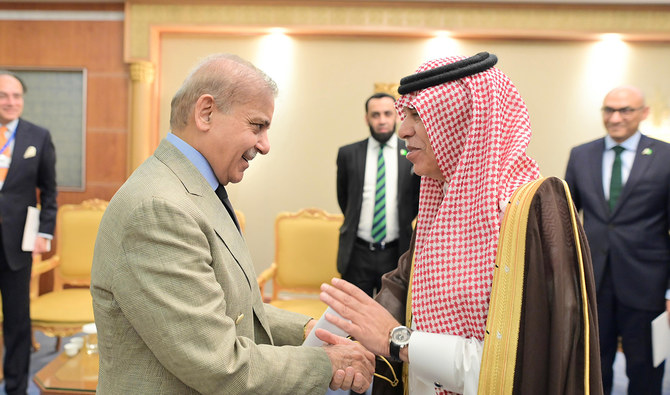
- Statement came after Shehbaz Sharif’s meeting with Saudi Commerce Minister Majid Al-Qasabi on WEF sidelines
- The WEF has convened a special meeting in Riyadh on global collaboration, growth and energy for development
ISLAMABAD: Prime Minister Shehbaz Sharif on Monday said Pakistan and Saudi Arabia would be taking “concrete measures” to boost the volume of bilateral trade between the two countries, Pakistani state media reported.
The statement came after PM Sharif’s meeting with Saudi Minister of Commerce Majid Al-Qasabi on the sidelines of a special meeting of the World Economic Forum in Riyadh.
Sharif informed the Saudi minister about the role of the Special Investment Facilitation Council (SIFC), set up in June, in promoting and facilitating the foreign investment.
“The Saudi minister told the prime minister that on the directives of Saudi Crown Prince and Prime Minister Mohammed bin Salman, the Kingdom was prioritizing trade and investment in Pakistan,” the state-run APP news agency reported.
“The Saudi minister said that the targets were being set to take the bilateral ties to a new height within one or one-and-half years.”
On the occasion, PM Sharif noted that Pakistani nationals had played a significant role in the progress and prosperity of Saudi Arabia, according to the report.
The Saudi commerce minister stressed the need to further promote Pakistan-Saudi Arabia ties among the youth.
Sharif arrived in Riyadh on Saturday to attend the WEF summit on global collaboration, growth and energy on April 28-29. The conference has convened more than 700 participants, including key stakeholders from governments and international organizations, business leaders from the WEF partner companies as well as young global leaders, experts and innovators.
After being on a number of panels at the WEF event on Sunday and holding several sideline meetings, the prime minister will address the closing plenary of the summit today, Monday, and also meet a number of top Saudi officials.
On Sunday, Sharif attended a Special Dialogue and Gala Dinner hosted by Crown Prince Mohammed bin Salman where they discussed bilateral ties as well as regional issues including the war in Gaza.
Sharif’s meeting with the crown prince took place less than a week after a high-powered delegation, headed by Saudi Foreign Minister Faisal bin Farhan, visited Pakistan to discuss investments.
“To continue the discussion, the Prime Minister said that he has brought with him a high-powered delegation to Riyadh, including key ministers responsible for investment, so that follow-up meetings could take place between relevant officials,” the Pakistani Prime Minister’s Office said.
Sharif reiterated his invitation to the Saudi crown prince for an official visit to Pakistan at his earliest convenience, the PMO added.
Pakistan and Saudi Arabia enjoy strong trade, defense and cultural ties. The Kingdom is home to over 2.7 million Pakistani expatriates and serves as the top source of remittances to the cash-strapped South Asian country.
Both Pakistan and Saudi Arabia have been closely working to increase bilateral trade and investment deals, and the Kingdom recently reaffirmed its commitment to expedite an investment package worth $5 billion.
Pakistan central bank holds key policy rate at 22 percent
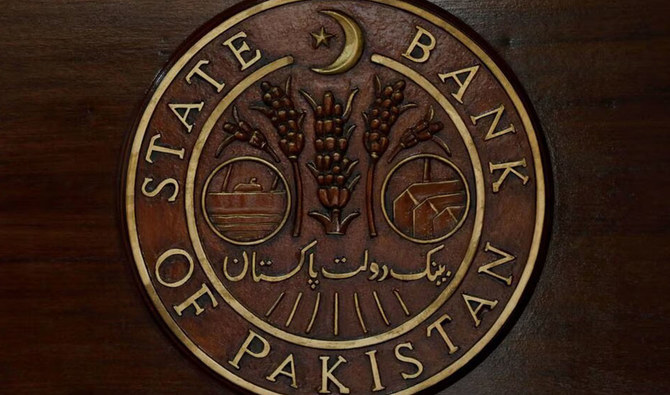
- Pakistan’s key rate was last raised in June to fight persistent inflationary pressures and to meet IMF conditions
- Reforms under IMF program have complicated task of keeping price pressures in check, however, inflation has slowed
KARACHI: Pakistan’s central bank kept its key interest rate unchanged at 22 percent for the seventh straight policy meeting on Monday, hours before the International Monetary Fund executive board meets to discuss the approval of $1.1 billion in funding for Pakistan.
Battling inflation and limited foreign exchange reserves, the cash-strapped South Asian nation is trying to navigate a path to economic recovery under a $3 billion standby arrangement with the IMF secured last summer to avert a sovereign default, and is hoping to sign a longer term program.
The bank’s monetary policy committee said in a statement that it was “prudent” to continue with its monetary policy stance at this stage to bring inflation down to the target range of 5 percent-7 percent by September 2025.
It added that it expected inflation to remain on a downward trajectory, but that recent oil price volatility poses a risk to the outlook. Consumers’ inflation expectations also edged up in April.
“In spite of the positive real interest rate, (the) Pakistan Central Bank rightly kept rates unchanged,” said Mohammed Sohail, chief executive at Topline Securities Ltd.
“This is mainly due to the risk of inflation remaining high in coming months due to higher global commodity prices and budgetary measures that may increase local prices,” he said.
Pakistan’s key rate was last raised in June to fight persistent inflation and to meet one of the conditions set by the IMF for securing the bailout. Reforms under the program have complicated the task of keeping price pressures in check. Inflation has slowed, however that has been primarily due to a high base effect.
Pakistan’s consumer price index (CPI) for March was up 20.7 percent from the same month last year, the lowest reading in nearly two years and below the finance ministry’s projections for the month.










